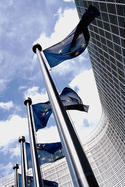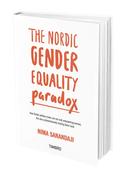Summer is usually a time for light reading, and for the most part, I indulged the usual array of historical novels, science fiction as well as my passion for ancient history. But two compelling books out this year led me to more somber thoughts about the prospects for the decline and devolution of western society. read more »
Europe
Eastern Europe Heads For A Brave Old World
Will a unified Europe survive Britain’s vote on Brexit? The referendum of last June pointed the country out of the European Union. Will France or Italy follow suit? If so, it could doom the structure that began in the 1950s as a customs union, if not an uneasy economic alliance to keep Germany from rearming and dominating central Europe. And will a consequence of Brexit be the re-emergence of Russia as the dominant power in Eastern Europe? Or will the European Union last long enough to bring prosperity to the forgotten countries of Eastern Europe? read more »
- Login to post comments
Commie Skin Jobs
This is Riga, Latvia. The Baltic Republics had a particularly difficult time during the twentieth century with Nazi Germany invading in 1941 and Soviet Russia occupying them until 1991. What had been a prosperous group of small Scandinavian style countries became relatively impoverished and isolated. read more »
- Login to post comments
Challenging Nordic Myths
Hillary Clinton, Bernie Sanders and numerous other American politicians want to increase taxes, regulate businesses and create a society where government takes responsibility for many aspects of daily life. If you are sick, the public sector should pay for your treatment and give you sick leave benefits. If you quit your job, taxpayers should support you. If you have a low income, the government should transfer money from your neighbor who has a better job. read more »
Urban Future: The Revolt Against Central Planning
In Milton Keynes, perhaps the most radical of Britain’s post-Second World War “New Towns,” the battle over Brexit and the culture war that it represents is raging hard. There, the consequences of EU immigration policy, of planning instituted by national authority, and of the grassroots yearning to preserve local character have clashed together to shape a platform that may set a precedent for whether central planners or local residents will determine the urban future. read more »
European GDP: What Went Wrong
First the two world wars, then a decline in the birth rate.
Newspapers these days are full of stories on World War I which started 100 years ago. They are also full of stories on today’s anemic European economy, as for example with Italy’s negative growth rate in the second quarter and France’s struggle to reach 1% GDP growth this year. At first blush, these two sets of stories are unrelated. But on closer look, it is apparent that the economy today is a distant echo of the war a century ago. And it all comes down to Europe’s demographics. read more »
- Login to post comments
Working Class British Voters Led the European Union Rejection
On Thursday night the first results from Britain’s referendum on pulling out of the European Union came in.
A small clue to the way things were going last night was the vote in the North East. read more »
- Login to post comments
Brexit Will Be Britain’s Fourth of July
The campaign to take the United Kingdom out of the European Union, widely known as “Brexit,” is potentially on the verge of a huge victory Thursday despite overwhelming opposition in the media and among the corporate and political establishment. The outcome matters not just as an expression of arcane British insularity, but as evidence of a growing rebellion against the ever greater consolidation and concentration of power now occurring across all of Europe, as well as here in the United States. read more »
Brexit: Why the Brits Will Stay... Or Go
On June 23, Britain votes on whether to remain in the European Union or to leave it. Either way, the point has been made and registered around the European continent that the British have more faith in the white rabbits of political fairy tales than they do in the sinkhole of Brussels and its economic policies. read more »
- Login to post comments
Scandinavian Women Do Well, Except at the Top
In which part of the world should we expect most women to reach the top? The answer has to be the Nordic countries. According to The Global Gender Gap report, for example, Iceland is the most gender equal country in the world followed by Norway, Finland and Sweden. Yet as I will discuss below, this has not translated in women making it to “the top”, as one might expect. This a paradox that I will seek to address. read more »
- Login to post comments






















